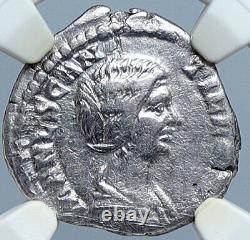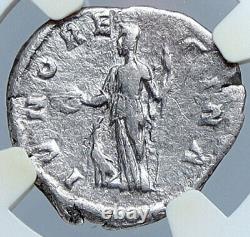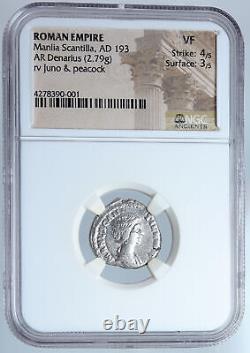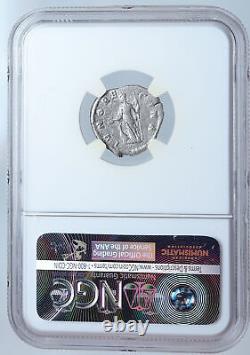
- Homepage
- Certification
- Coin Id
- Composition
- Grade
- Ruler
- Antoninus Pius (52)
- Augustus (141)
- Caracalla (53)
- Constantine I (57)
- Constantine Ii (29)
- Domitian (58)
- Gallienus (37)
- Gordian Iii (62)
- Hadrian (100)
- Marcus Aurelius (68)
- Nero (113)
- Nerva (31)
- Philip I (66)
- Septimius Severus (35)
- Severus Alexander (69)
- Theodosius Ii (32)
- Tiberius (69)
- Trajan (97)
- Trajan Decius (28)
- Vespasian (76)
- Other (1599)
- Year-mint-denom
MANLIA SCANTILLA wife of Didius Julianus 193AD Silver Roman Coin NGC VF i59096






Item: i59096 Authentic Ancient Coin of. Manlia Scantilla, wife of Didius Julianus Silver Denarius 18mm (2.79 grams) Rome mint. RIC (Julianus) 7a; RSC 2 VERY RARE! MANL SCAN-TILLA AVG, draped bust of Scantilla right. IVNO RE-GINA, Juno standing left, holding patera and scepter, behind her peacock standing left, head right.
193 was a Roman woman who lived in the 2nd century. She was very briefly Roman Empress as wife to the Roman Emperor Didius Julianus. Her name indicates that she was born into the gens Manlia , which if correct, indicates an illustrious patrician ancestry. Manlia Scantilla married the general Didius Julianus before his succession.
Around 153, she bore Julianus a daughter and only child Didia Clara, who was known for her beauty. Her husband became emperor on 28 March 193 (known as " Year of the Five Emperors "). On that day, Scantilla and her daughter, were awarded the title of Augusta by a decree of the Roman Senate. Scantilla enjoyed her title and status for less than three months because Julianus was killed on 1 June 193.The new emperor, Septimius Severus, removed her status and title as Augusta, but gave Scantilla and her daughter the former emperor's body for burial. The two women buried Julianus in a tomb alongside his great-grandfather, outside of Rome. Within a month of Severus' accession to the throne, Scantilla died in obscurity.
The fate of her only child Didia Clara is unknown. Marcus Didius Severus Julianus Augustus. 30 January 133 or 2 February 137 - 1 June 193, was Roman Emperor for nine weeks during the year 193.This led to the Roman Civil War of 193-197. Julianus was ousted and sentenced to death by his successor, Septimius Severus. Julianus was born to Quintus Petronius Didius Severus and Aemilia Clara.
Julianus's father came from a prominent family in Mediolanum (Milan) and his mother was a North African woman of Roman descent, from a family of consular rank. His brothers were Didius Proculus and Didius Nummius Albinus. His date of birth is given as 30 January 133 by Cassius Dio and 2 February 137 by the Historia Augusta.
Didius Julianus was raised by Domitia Lucilla, mother of Roman Emperor Marcus Aurelius. With Domitia's help, he was appointed at a very early age to the vigintivirate, the first step towards public distinction. He married a Roman woman named Manlia Scantilla, and sometime around 153, Scantilla bore him a daughter and only child Didia Clara. In succession Julianus held the offices of Quaestor and Aedile, and then, around 162, was named as Praetor. He was nominated to the command of the Legio XXII Primigenia in Mogontiacum (now Mainz). In 170, he became praefectus of Gallia Belgica and served for five years. As a reward for his skill and gallantry in repressing an insurrection among the Chauci, a tribe dwelling on the Elbe, he was raised to the consulship in 175, along with Pertinax. It was around this time that he was charged with having conspired against the life of Commodus, but he had the good fortune to be acquitted and to witness the punishment of his accuser. He governed Bithynia and succeeded Pertinax as the proconsul of Africa. Titus Flavius Claudius Sulpicianus, prefect of the city, father-in-law of the murdered emperor, being at that moment in the camp to which he had been sent to calm the troops, began making offers, whereupon Julianus, having been roused from a banquet by his wife and daughter, arrived in all haste, and being unable to gain admission, stood before the gate, and with a loud voice competed for the prize. Eventually Sulpicianus promised 20,000 sesterces to every soldier; Julianus, fearing that Sulpicianus would gain the throne, then offered 25,000. The guards immediately closed with the offer of Julianus, threw open the gates, saluted him by the name of Caesar, and proclaimed him emperor.Threatened by the military, the Senate declared him emperor. His wife and his daughter both received the title Augusta.
Upon his accession, Julianus immediately devalued the Roman currency, decreasing the silver purity of the denarius from 87% to 81.5% - the actual silver weight dropping from 2.75 grams to 2.40 grams. After the initial confusion had subsided, the population did not tamely submit to the dishonour brought upon Rome.
Whenever Julianus appeared in public he was saluted with groans, imprecations, and shouts of robber and parricide. The mob tried to obstruct his progress to the Capitol, and even threw stones. When news of the public anger in Rome spread across the Empire, the generals Pescennius Niger in Syria, Septimius Severus in Pannonia, and Clodius Albinus in Britain, each having three legions under his command, refused to recognize the authority of Julianus. Julianus declared Severus a public enemy because he was the nearest of the three and, therefore, the most dangerous foe. Deputies were sent from the Senate to persuade the soldiers to abandon him; a new general was nominated to supersede him, and a centurion dispatched to take his life. The Praetorian Guard, long strangers to active military operations, were marched into the Campus Martius, regularly drilled, and trained in the construction of fortifications and field works.Severus, however, having secured the support of Albinus by declaring him Caesar, progressed towards the city and made himself master of the fleet at Ravenna. He defeated Tullius Crispinus, the Praetorian Prefect, who had been sent to halt his progress, and gained over to his cause the ambassadors sent to turn his troops. The Praetorian Guard, lacking discipline and sunk in debauchery and sloth, were incapable of offering any effectual resistance.
Matters being desperate, Julianus now attempted negotiation and offered to share the empire with his rival. Severus ignored these overtures and pressed forward, all Italy declaring for him as he advanced. At last the Praetorians, having received assurances that they would suffer no punishment - provided they surrendered the actual murderers of Pertinax - seized the ringleaders of the conspiracy and reported what they had done to Silius Messala, the consul, by whom the Senate was summoned and informed of the proceedings. The Senate passed a motion proclaiming Severus emperor, awarded divine honours to Pertinax, and sentenced Julianus to death. Julianus was deserted by all except one of the prefects and his son-in-law, Repentinus. Julianus was killed in the palace by a soldier in the third month of his reign (1 June 193).Severus dismissed the Praetorian Guard and executed the soldiers who had killed Pertinax. According to Cassius Dio, who lived in Rome during the period, Julianus's last words were But what evil have I done?
His body was given to his wife and daughter, who buried it in his great-grandfather's tomb by the fifth milestone on the Via Labicana. Ilya Zlobin, world-renowned expert numismatist, enthusiast, author and dealer in authentic ancient Greek, ancient Roman, ancient Byzantine, world coins & more. Ilya Zlobin is an independent individual who has a passion for coin collecting, research and understanding the importance of the historical context and significance all coins and objects represent.
Send me a message about this and I can update your invoice should you want this method. Getting your order to you, quickly and securely is a top priority and is taken seriously here. Great care is taken in packaging and mailing every item securely and quickly. What is a certificate of authenticity and what guarantees do you give that the item is authentic? You will be very happy with what you get with the COA; a professional presentation of the coin, with all of the relevant information and a picture of the coin you saw in the listing.Additionally, the coin is inside it's own protective coin flip (holder), with a 2x2 inch description of the coin matching the individual number on the COA. Whether your goal is to collect or give the item as a gift, coins presented like this could be more prized and valued higher than items that were not given such care and attention to. Is there a number I can call you with questions about my order?
When should I leave feedback? Please don't leave any negative feedbacks, as it happens sometimes that people rush to leave feedback before letting sufficient time for their order to arrive. The matter of fact is that any issues can be resolved, as reputation is most important to me.My goal is to provide superior products and quality of service. How and where do I learn more about collecting ancient coins? Visit the "Guide on How to Use My Store" for on an overview about using my store, with additional information and links to all other parts of my store which may include educational information on topics you are looking for. You may also want to do a YouTube search for the term "ancient coin collecting" for educational videos on this topic. This item is in the category "Coins & Paper Money\Coins: Ancient\Roman: Imperial (27 BC-476 AD)".
The seller is "highrating_lowprice" and is located in this country: US. This item can be shipped worldwide.
- Certification Number: 4278390-001
- Certification: NGC
- Grade: VF
- Year: Year_in_description
- Composition: Silver
- Ruler: Manlia Scantilla
- Denomination: Denarius

